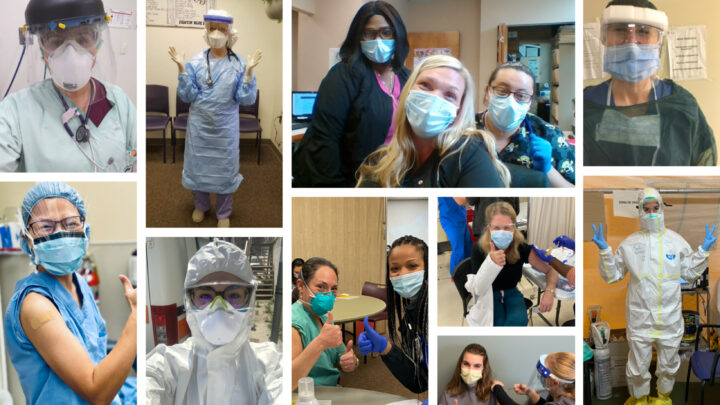
Sermo insights from an internal poll to U.S community members reveal that 46% of physicians are interested in becoming travel doctors. For physicians seeking adventure, flexibility, and professional growth, the modern medical landscape is ripe with unprecedented opportunities.
As healthcare systems worldwide struggle with physician shortages, becoming a travel doctor has emerged as an increasingly attractive career path. For physicians experiencing burnout, working as a traveling physician offers a solution combining clinical expertise with the freedom to experience new environments.
A recent survey on Sermo shows that 59% of physicians travel one to five times per year, while 39% travel for both professional and personal purposes. Notably, 28% prefer international travel, and 22% are open to traveling everywhere, indicating a global perspective that aligns well with global health careers.
Perhaps most significantly, 40% of physicians find travel energizing, while only 12% find it exhausting, with 47% noting it depends on the reason for travel.
The appeal of becoming a traveling doctor represents a fundamental shift toward a more flexible, autonomous approach to medical practice. From emergency physicians to traveling surgeons, the traveling doctor lifestyle has captured the imagination of medical professionals worldwide. This comprehensive guide will explore how to turn this dream into reality, providing a step-by-step roadmap for physicians ready to embark on a new journey.
What is a travel doctor?
A travel doctor, often called a traveling physician, is a medical specialist who practices medicine in different locations rather than being tied down to a single hospital or clinic. Traveling doctors are independent contractors who work abroad on assignments lasting a few weeks to even months at a time. Nearly every physician specialty can pursue this path, including traveling surgeons, but demand is highest in specialties experiencing the most critical physician shortages.
Travel doctor opportunities are growing, particularly in countries with significant healthcare challenges. In the UK, for instance, the National Health Service faces low satisfaction and a shortage of doctors. In response, the Labour government’s 10-year plan emphasizes digitization, community-based care, and prevention. These professionals must quickly integrate into new teams, understand different electronic health record systems, and adapt to varying hospital policies.
In many cases, a travel doctor also provides services at a travel clinic, preparing travelers with vaccinations like yellow fever, typhoid, tetanus, and routine primary care advice. This blend of travel medicine and hospital-based practice makes the career both diverse and rewarding.
Recent poll data from the Sermo community reveals significant interest in travel medicine careers among U.S. physicians. When asked, “Have you ever considered working as a travel doctor?” 10% said they are actively pursuing it, 36% noted they are still researching their options, 48% admitted they haven’t yet, but might in the future, and only 10% responded that it’s not for them (note: multiple answers were allowed).
A staggering 90% of surveyed physicians have either considered or are open to considering travel medicine opportunities, demonstrating the widespread appeal of this career path. The high percentage of physicians still researching their options suggests a strong demand for comprehensive guidance on how to transition into travel medicine.
If you’re still exploring whether travel medicine is the right fit, you might also want to look into alternative careers for doctors.

How to become a travel doctor
Transitioning into a traveling doctor career requires careful planning and understanding of the various pathways available. The journey involves critical steps that build upon your existing medical knowledge while preparing you for practicing medicine across different locations.
1. Earn your academic credentials
The foundation of any travel doctor career begins with obtaining proper academic credentials and maintaining active medical licensure. All traveling doctors must possess a medical degree from an accredited institution, complete residency training, and in most cases, maintain board certification.
For physicians interested in international positions abroad, additional language skills and cultural competency training provide significant advantages. A background in travel medicine and primary care is often beneficial, especially for those interested in working at a travel clinic where patients require preventive counseling and vaccinations such as yellow fever, typhoid, and tetanus.
2. Consider the type of travel doctor you want to become
Working as a travelling physician includes numerous career paths with distinct requirements and benefits.
Government work
Government positions offer structured pathways into international doctor jobs. Organizations like the CDC, WHO, Peace Corps, and military medical services provide opportunities for physicians to work on public health initiatives worldwide with comprehensive benefits packages. Many such positions involve travel medicine training and serving as a medical specialist for patients abroad.
Locum Tenens
Locum tenens represents the most accessible entry point for physicians seeking to become traveling doctors, often with high-paying salaries. This career pathway offers immediate opportunities to gain experience in travel medicine while maintaining clinical skills in both hospitals and clinics.
Nonprofit work
Nonprofit organizations provide meaningful opportunities for physicians interested in overseas medical work. Organizations like Doctors Without Borders offer structured programs for physicians seeking to make a global impact, often requiring travel for doctors to manage diverse patient populations while administering primary care, typhoid, or yellow fever vaccines. It’s important to note that some of these organizations pay physicians, while others, like International Medical Relief, offer non-paid volunteer opportunities.
Medical ministry opportunities
Medical ministry combines healthcare delivery with faith-based service, providing physicians with opportunities to deliver care in underserved communities. Different roles in this category include missionary doctors, outreach clinics, and disaster relief positions.
These positions often require treating patients abroad with limited access to clinics and modern care. Doctors who take on these positions must be flexible and culturally sensitive as they deliver both healthcare and humanitarian aid as part of a faith-driven outreach.
Expedition and Sports Medicine
Expedition medicine involves medical support for expeditions and sporting events. Traveling surgeons and other specialists can find opportunities providing medical coverage for professional sports teams and adventure racing events, often serving travelers in remote environments where tetanus shots or rapid response primary care are crucial.
3. Acquire individual insurance policies
As independent contractors, travel doctors must secure comprehensive insurance coverage.
Health Insurance
Traveling doctors must obtain individual health insurance policies that provide coverage across multiple states or abroad, including comprehensive medical coverage and emergency medical evacuation insurance.
Disability Insurance
Disability insurance becomes even more critical for travel physicians who lack the safety net of employer-provided benefits in the case of an accident or injury. As one Sermo community member and dermatologist in the USA notes, “As time goes by and you develop more financial stability, you may opt for less insurance…One’s specialty is quite essential, as well as the elimination period and cost.”
Life Insurance
Life insurance provides essential financial protection for travel doctors’ families, particularly given the unique risks associated with practicing medicine in rural or hard-to-reach locations. A surgery specialist from the UK shares their perspective: “The truth is, there is so much benefit to having Life insurance as a doctor. Doctors are among the most stressed-out groups of individuals, and they have a relatively high mortality rate. It will help protect dear family members.”
Malpractice Insurance
Malpractice insurance represents the most critical coverage for travel doctors, as highlighted by a physiatrist from the USA: “A huge percentage of good docs get sued—usually for something that should not have caused a lawsuit. Errors can only be minimized and learned from, not avoided entirely. We often have lots of cognitive and emotional responses [to being sued] since we are normal functioning human beings.” Travel physicians must secure occurrence-based malpractice insurance that provides coverage regardless of when or where claims are filed.
4. Define the goals you want to achieve while being a travel doctor
A successful transition into medical careers abroad requires clear goal-setting. Physicians must evaluate their objectives, considering desired income levels, preferred locations abroad, work-life balance goals, and career aspirations. Some traveling doctors seek to maximize earning potential through high-paying assignments in underserved areas, while others prioritize cultural experiences and travel medicine exposure.

How can you find traveling doctor job opportunities?
The most accessible pathway into a career as a traveling physician is through locum tenens staffing agencies. These organizations connect doctors with hospitals and clinics that are facing temporary staffing shortages, while also managing licensing, contracts, travel, and housing arrangements. For many, it’s the easiest way to start building experience in medical work overseas.
As one GP in the USA writes on Sermo, “Locum tenens companies offer flexible, short-term medical positions that can provide excellent pay—often higher than permanent roles—especially in high-demand specialties. However, salary varies widely based on location, medical specialty, and company, so it’s important to research each company’s reputation and contract terms carefully. Look for transparency in pay ranges.”
An OBGYN in Venezuela agrees, ”I can honestly say it has been both a challenging and rewarding experience. One of the biggest advantages was regaining control over my schedule while still earning competitively—sometimes even more than in traditional roles. Transparency in pay structure is crucial, especially when considering physician jobs as an independent contractor. The average salary can be quite compelling.”
Some physicians even treat locum tenens as a form of side hustle for doctors, helping them earn extra income while keeping flexibility intact.
For others, locum tenens is a way to balance work and lifestyle. A family medicine physician explains, “This is a valid option to consider for extra income and the ability to combine it with your regular schedule and life. Many clinicians find this works well for their lifestyle.”
Some doctors take the flexibility even further. A U.S.-based family medicine physician shares on Sermo, “I’ve done locums for years, traveled 1000s of miles, would fly weekly, and sometimes 5-6 times a month back and forth. The pay is well, depending on the area and your lifestyle, but it can be a suitable job, long term.”
These perspectives underscore why locum tenens remains the most common and rewarding entry point for doctors seeking global health careers.
Benefits of becoming a traveling doctor
International doctor jobs provide unique advantages over traditional practice settings.
Opportunity to travel & explore
Travel doctors can combine medical careers with exploration and cultural immersion. It represents the second most popular factor for why to work as a travel physician, according to our Sermo survey, with 62% of surveyed U.S. physicians choosing this benefit.
Working as a traveling physician provides extended stays in different locations, allowing for deeper cultural understanding and meaningful community connections.
Flexibility & work-life balance
Insights from the Sermo community reveal that the biggest motivation is flexibility and work-life balance, with 63% of physicians choosing this benefit.
Variety in work settings
Travel doctors experience a wide variety in work settings, from rural hospitals to urban academic medical centers, international missions, and travel clinics supporting travelers with travel medicine needs. 28% of surveyed physicians say this variety is what interests them about working as a travel doctor.
Higher earnings potential
Travel doctors earn an average of $217,445 per year, with higher pay than permanent residents. 37% of surveyed physicians say higher earning potential is what drives their interest in travel opportunities.
Professional growth & networking
Medical careers abroad accelerate professional growth by exposing physicians to diverse medical practices, technologies, peers, and patient populations.
How much do traveling doctors make?
Travel doctors typically earn around $217,445 a year, with salaries varying significantly by specialty. Traveling surgeons and emergency physicians earn some of the highest rates, particularly in underserved areas abroad. Underserved areas and regions with critical physician shortages typically offer the highest compensation packages to attract qualified physicians.
The earning potential for travel doctors extends beyond base hourly rates, as many agencies provide additional benefits, including housing allowances, travel reimbursements, and comprehensive insurance coverage. Many agencies ensure coverage of critical expenses such as malpractice insurance and travel, enhancing take-home pay. The total compensation package often proves attractive despite lower hourly rates when considering the reduced living expenses and unique experiences available in international assignments.
Start your global journey with Sermo!
The thrill of becoming a travel doctor represents a transformative career opportunity that can open doors to unprecedented professional and personal growth.
Whether in travel medicine, primary care, or as a medicine specialist in travel clinics, the opportunities are vast. Beyond locum tenens, physicians can pursue government positions with organizations like the CDC or WHO, or engage in nonprofit work with groups such as Doctors Without Borders, often focusing on global public health initiatives and humanitarian aid. Additionally, opportunities exist in medical ministry and expedition medicine, providing care in underserved communities or supporting specialized events.
For physicians searching for alternative career choices, the combination of higher earning potential, lower costs of living, increased flexibility, diverse work environments, and global exploration creates a compelling value proposition.
Ready to explore travel doctor job opportunities and connect with physicians already living this adventurous lifestyle? Join the Sermo community today to access exclusive insights, job opportunities, and peer support from thousands of physicians worldwide. Connect with experienced traveling doctors, share your own journey, and discover how the global medical community can support your transition into this exciting and rewarding career path.















